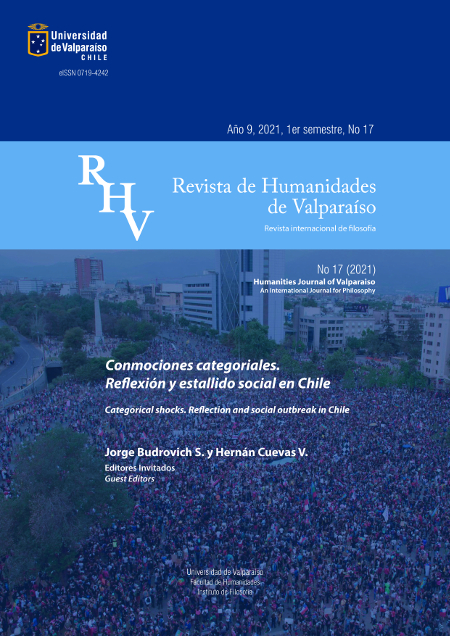Interpretar el sufrimiento: Walter Benjamin, Theodor W. Adorno y la cuestión de la verdad
DOI:
https://doi.org/10.22370/rhv2021iss17pp251-269Palabras clave:
núcleo temporal, verdad negativa, duelo, sufrimiento, catástrofe, interpretación crítica, Walter Benjamin, Theodor AdornoResumen
Este artículo postula que la criticidad de la epistemología elaborada por Walter Benjamin y Theodor W. Adorno se fundamenta no tanto en la reformulación de una praxis filosófica contra la razón moderna, sino principalmente en la metamorfosis del concepto de verdad. En concreto, se afirma que la crítica de la razón moderna efectuada por ambos pensadores se asocia a la determinación del núcleo temporal de la verdad como negatividad y duelo. En el contexto de una crisis racional, Benjamin y Adorno abren la posibilidad de una vinculación con la objetividad en la forma de una interpretación crítica de ese núcleo temporal. Ésta, vinculada con la dialéctica de la catástrofe moderna, se ocupa de exponer los fragmentos producidos por la super-determinación subjetivista regida por la lógica de la identidad. Para justificar esto, en primer lugar, explicamos la identificación realizada por ambos filósofos entre núcleo temporal de la verdad y el concepto de verdad luctuoso-negativa; imbricación que procura condensar las consecuencias de la constitución subjetivista de la razón. Luego, señalamos la conjugación de esa definición de la verdad con la producción del sufrimiento. A continuación, determinamos en qué sentido la negatividad de la verdad abre el carácter dialéctico de la catástrofe moderna. Por último, indicamos la necesaria asociación de semejante epistemología crítica a la apocatástasis histórica.
Descargas
Referencias
Adorno, Theodor (1991). Actualidad de la Filosofía. En Th. Adorno, Actualidad de la filosofía, pp. 73-102. Barcelona: Paidós.
Adorno, Theodor (2004). Teoría estética. Madrid: Akal.
Adorno, Theodor (2005). Dialéctica negativa. La jerga de la autenticidad. Madrid: Akal.
Adorno, Theodor (2012). Sobre la metacrítica de la teoría del conocimiento. Tres estudios sobre Hegel. Madrid: Akal.
Adorno, Theodor (2013). Introducción a la dialéctica. Buenos Aires: Eterna Cadencia.
Adorno, Theodor (2020). Lecciones sobre dialéctica negativa: fragmentos de las lecciones de 1965-1966. Ciudad Autónoma de Buenos Aires: Eterna Cadencia.
Benjamin, Walter (1992). Zentralpark. En W. Benjamin, Cuadros de un pensamiento, pp. 173-218. Buenos Aires: Imago Mundi.
Benjamin, Walter (2001a). La enseñanza de lo semejante. En W. Benjamin, Iluminaciones IV, pp. 85-89. Madrid: Taurus.
Benjamin, Walter (2001b). Sobre el lenguaje en general y sobre el lenguaje de los humanos. En W. Benjamin, Iluminaciones IV, pp. 59-74. Madrid: Taurus.
Benjamin, Walter (2001c). Sobre el programa de la filosofía venidera. En W. Benjamin, Iluminaciones IV, pp. 75-84. Madrid: Taurus.
Benjamin, Walter (2005). Libro de los Pasajes. Madrid: Akal.
Benjamin, Walter (2006). Sobre el concepto de historia. En M. Reyes Mate, Medianoche en la historia, pp. 49-302. Madrid: Trotta.
Benjamin, Walter (2012). Origen del Trauerspiel alemán. Buenos Aires: Gorla.
Bonnet, Alberto (2007). Antagonismo y diferencia: la dialéctica negativa y el posestructralismo ante la crítica del capitalismo contemporáneo. En J. Holloway, F. Matamoros, S. Tischler (comps.), Negatividad y revolución. Theodor W. Adorno y la política, pp. 37-72. Buenos Aires: Herramienta y México: Universidad Autónoma de Puebla.
Echeverría, Bolívar (2010). Modernidad y blanquitud. México D. F.: Ediciones Era.
Forster, Ricardo (2014). La travesía del abismo. Mal y Modernidad en Walter Benjamin. Ciudad Autónoma de Buenos Aires: Fondo de Cultura Económica.
Jameson, Fredric (2004). Una modernidad singular. Ensayo sobre la ontología del presente. Barcelona: Gedisa.
Reyes Mate, Manuel (1991). Benjamin o el primado de la política sobre la historia. Isegoría, 4, 49-73. https://doi.org/10.3989/isegoria.1991.i4.353
Sontag, Susan (2005). Contra la interpretación. Buenos Aires: Alfaguara.
Spengler, Oswald (1993). La decadencia de Occidente. Barcelona: Planeta.
Tiedemann, Rolf (2005). Introducción del editor. En W. Benjamin, Libro de los Pasajes, pp. 7-33. Madrid: Akal.
Vedda, Miguel (2012). Introducción: Melancolía, transitoriedad, utopía. Sobre El origen del Trauerspiel alemán. En W. Benjamin, Origen del Trauerspiel alemán, pp. 5-51. Buenos Aires: Gorla.
Vedda, Miguel (2016). Crisis del lenguaje y ocaso de la experiencia en Walter Benjamin y Siegfried Kracauer. Constelaciones. Revista De Teoría Crítica, 6(6), 308-321. http://constelaciones-rtc.net/article/view/871
Wellmer, Albrecht (2013). Líneas de fuga de la modernidad. Buenos Aires: Fondo de Cultura Económica, Universidad Autónoma.
Descargas
Publicado
Número
Sección
Licencia
Aquellos autores/as que tengan publicaciones con esta revista, aceptan los términos siguientes:
- Los autores/as conservarán sus derechos de autor y garantizarán a la revista el derecho de primera publicación de su obra, el cual estará simultáneamente sujeto a la Licencia de reconocimiento de Creative Commons (CC BY-NC-ND 4.0 International) que permite a terceros compartir la obra siempre que se indique su autor y su primera publicación esta revista.
- Los autores/as podrán adoptar otros acuerdos de licencia no exclusiva de distribución de la versión de la obra publicada (p. ej.: depositarla en un archivo telemático institucional o publicarla en un volumen monográfico) siempre que se indique la publicación inicial en esta revista.
- Se permite y recomienda a los autores/as difundir su obra a través de Internet (p. ej.: en archivos telemáticos institucionales o en su página web) antes y durante el proceso de envío, lo cual puede producir intercambios interesantes y aumentar las citas de la obra publicada. (Véase El efecto del acceso abierto).






